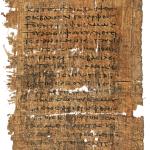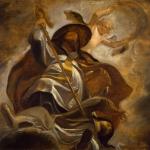Hi! I am a cultural sociologist on a tour of Texas Megachurches. Check out my first post here.
Today I am covering Oak Hills Church and its celebrity pastor, Max Lucado.
**************************************************************************************************************
First, Some Background
Of all the notable figures in American evangelicalism, it is Max Lucado who, for me, best typifies the profound shifts that evangelical culture has sustained in its codes of masculinity.
It is hard to fully explain how American Protestantism has found its way from Jonathan Edwards and John Wayne to Max Lucado. Given the rugged, assertive masculinity of John Wayne, someone like Mark Driscoll (with a macho style) makes ready sense, but Max Lucado is harder to plot.
Edwards, you may recall, famously indicted sinners and threatened them with hellfire:
“Your wickedness makes you as it were heavy as lead, and to tend downwards with great weight and pressure towards hell […] and all your righteousness, would have no more influence to[…]keep you out of hell, than a spider’s web would have to stop a falling rock.”
Sinners were, in Edwards’ telling, a blight on creation:
“[t]he sun does not willingly shine upon you to give you light to serve sin and Satan; the earth does not willingly yield her increase to satisfy your lusts; nor is it willingly a stage for your wickedness to be acted upon; the air does not willingly serve you for breath to maintain the flame of life in your vitals, while you spend your life in the service of God’s enemies.”
But by the 1990s, something in evangelicalism had profoundly shifted and that shift is crystal clear in the oeuvre of Max Lucado, who has built a very influential career on the idea that:
“If God had a refrigerator, your picture would be on it. If He had a wallet, your photo would be in it. He sends you flowers every spring and a sunrise every morning… Face it, friend. He is crazy about you!”
Over the course of the last three decades, Lucado has sold book after book– more than 145 million copies in over 50 languages worldwide– that depicts God as motivated, not by anger, but by sentimental attachment to his human children.
In Homespun Gospel: The Triumph of Sentimentality in American Evangelicalism (Oxford 2014), historian Todd Brenneman treats Lucado’s sentimental God via a concept Brenneman terms: “the cutesy.” A cute God, Brenneman offers, is a God who “keeps mementos, a God who is very fond of people. This God cheers humanity’s successes, weeps at their failures, and ultimately just wants to bring his children home.” Noting the profound shift such sentimentality really entails, Brenneman observes, “[w]ords like ‘atonement’ and ‘substitution’ and ‘propitiation’ and even phrases such as ‘Christus Victor’ dot the history of Christian thought […] For the cutesy God, however, the reasons for the atonement reduce to feeling: God saved you because he is fond of you. He likes having you around.”
This isn’t the evangelicalism of Kristin KobesDu Mez’ John Wayne-strain: “mythical warriors and rugged soldiers, men like Oliver North, Ronald Reagan, Mel Gibson, and the Duck Dynasty clan, who assert white masculine power in defense of ‘Christian America.’” No, Lucado’s God is the masculine counterpart to evangelicalism’s sentimental family culture, per Brenneman:“The reader is to think of God as a being whose concern is to make his child happy, to dote on them, to provide them with gifts, to express his love in the very ordinariness of life—flowers and sunrise.”
But could it be that Lucado’s sentimental God is just a glow up of the John Wayne-one? Brenneman asserts there can be a dark underbelly to Lucado’s “sweet kitsch” culture, in which adherents might feel justified in feeling that those who do not share this “universal’ feeling” are “almost inhuman and deserve to be treated as such.” Brenneman surmises that an emotional move might easily be made from a sentimental appreciation of something one values [here, cute evangelical culture] to, instead, a “fury at the thought that some people think otherwise.” Such an underbelly, Brenneman suggests, can transform a sentimental preacher, even a Max Lucado (who writes children’s books about caterpillars who need to learn they are special to God!), into an angry and militant nationalist. 
Well, no such actual fury at cultural shifts seems to have taken hold of Max Lucado in 2016 or since. Instead in a surprising Washington Post article during that campaign season, Lucado advocated for –not Hilary Clinton–but for decency in public life, saying:
“I have no inside track on the intricacies of a presidential campaign. I’m a pastor. I don’t endorse candidates or place bumper stickers on my car. But I am protective of the Christian faith. If a public personality calls on Christ one day and calls someone a ‘bimbo’ the next, is something not awry?”
In this essay, Lucado used evangelicalism’s family discourse to try to dissuade evangelical voters from Trump:
“As the father of three daughters, I reserved the right to interview their dates… A five-minute face-to-face with the guy was a fair expectation… I wanted to know if he was decent. This was my word: “decent.” Would he treat my daughter with kindness and respect? In his language, actions and decisions, would he be a decent guy?”
Decency, Lucado asserted, “mattered to me as a dad,” and decency, he tried to argue: “matters to Americans.”
By now, you know, what Lucado called “decency” did not much matter to Trump voters that year. (Or perhaps they might say other things mattered more.) But it was one of the surprises of the 2016 election cycle that neither Max Lucado nor Beth Moore, evangelical superstars with sterling credibility amassed over decades, could do anything at all to stymie evangelical support for Donald Trump. Whatever their publishing records suggest, and Moore and Lucado together might be the best selling evangelical authors of our time, neither one of them seemed to have much (of what some call) “celebrity authority” in 2016.
Notes From My Visit
I was dreading my visit to Oak Hills Church in this series that I proposed, in which I visit Texas megachurches to listen for White Christian Nationalism. In my initial plan for these visits, I said I would be looking for– not just overt Christian Nationalist ideas–but also for soft White Christian Nationalist powers, including celebration of, or centering of, the aesthetics of whiteness. Two years ago I visited Oak Hills church and left, frankly, dismayed at how unwaveringly white its aesthetics were. That visit, the worship leader was an older white man with a full, white handlebar mustache who played Americana-sounding country worship on a guitar. I lamented how inaccessible some of this music really was to the ethnically diverse audiences in the Oak Hills pews. The crowds at Oak Hills are not as diverse as the ones at Cornerstone or Community Bible Church and I left suspecting this music was one reason for that. The man sang in a style that might best befit a small west Texas town, not the thriving metroplex of San Antonio, the seventh-most populous in the United States, and already 64% hispanic at that time. Given that all other visible leadership of the church, the co-pastors and assistants all looked to be white men at that time, I found it a little hard to understand why the worship, too, would so poorly reflect the diversity of our city.
As I prepped for last week’s visit, I popped onto the church website and again grew concerned. The leadership team on the website still appears overwhelmingly white and male, and this in comparison to the other megachurches I’ve covered so far– CBC and Cornerstone–though, admittedly, one has to be a Hagee to be featured as a cornerstone leader. I knew I would be writing this post, so I felt preemptive dismay at the possibility that the sweetest megachurch in San Antonio (about 6k attend) might also be the purveyor of the most whitened version of Christian Nationalism in the city.
Thankfully, as soon as I entered the doors for the 10:30 am service, I knew some things had changed. All the large pictures covering the walls featured diverse faces. The auditorium was also immediately surprising: the lights were down and there were seven worship leaders on the stage. Most of these leaders seemed to be between the ages of 20 and about 40. Like the leaders at Community Bible, they were dressed down, in jeans and tennis shoes and boots.
The crowd was singing loudly and I observed many hands in the air. All songs in the line-up seemed to be from the Big Four powerhouses of charismatic worship (Bethel; Hillsong, Passion, and Elevation). The performance was very good: there was a full band and the sound was well-mixed. The vocalists were good and, critically, looked to be ethnically diverse.
Christianity Today has been alerting audiences to the dominance of charismatic worship; Bob Smeitana depicts the dominance of charismatic worship as a “takeover.” (Some question whether Hillsong, for example, should be put out of business.) But what adopting charismatic worship means for Oak Hills is a much more diverse set of worship leaders and a more accessible aesthetic for a diverse congregation. Given the popularity of charismatic worship music today– the same songs are being sung across a wide breadth of evangelical and non-denominational churches– this music serves as a ready, available means by which to draw diverse audiences together.
In addition to song lyrics on the screen, on this visit I note that the visuals behind the song are of (first) running water and then of the earth, from what appears to be a position in space. I am looking at the entire world, slowly revolving, little clouds crawling across

its surface. In my experience, it is pretty common for images of nature to be displayed as a background for the words to the song that is being sung. Nature imagery also frequently pops up in the actual lyrics: “Oceans (Where Feet May Fail),” is Hillsong’s biggest hit, “a nearly nine-minute ballad with sweeping minor keys and swelling guitar that spent a record 61 (non-consecutive) weeks at No. 1 on the Billboard Hot Christian Songs chart.” Shout to the Lord, Ocean’s predecessor in popularity, invokes “all the earth” to sing and foretells of a time that “mountains bow down” and “seas will roar.” Released in 1995, the song is still sung in an estimated 30 million churches each week.
I think this earthy imagery might be an example of evangelicals’ continuing their tradition of nature mysticism. Brett Grainger’s Church in the Wild (Harvard 2019) argues that it was– not the Transcendentalists, but– the evangelical revivalists who transformed the everyday religious life of Americans and spiritualized the natural environment. The very accessible, popular music of charismatic powerhouses continues to invoke the natural environment as metaphors for spiritual renewal.)It is critical to note that, while earthy images are very popular visuals for charismatic worship, few if any popular images for charismatic worship are of guns or military imagery.
Adopting charismatic worship styles has changed Oak Hills Church. With Max Lucado in leadership, Oak Hills has been a bastion of evangelicalism’s domestic, sentimental, and family centered culture. In acquiring a charismatic worship repertoire, Oak Hills has expanded its depictions of God, from a domestic God with a refrigerator, covered with pictures of his beloved human children– a figure right at home with Garrison Keillor’s Prairie Home Companion– to (include, as well) a more transcendent God that can be engaged through music that perpetuates evangelicals’ romanticism about the natural world.
Finally: Was Oak Hills Christian Nationalist Last Weekend?
As best I can tell, Oak Hills’ sonic shift to a beautiful vision for the whole earth actually helped Oak Hills skip making Christian Nationalist statements from its pulpit –at a time it might have been very hard to do so.
Admittedly, last Sunday was not a normal time to assess the nationalism of Texas megachurches, with so much distress following Hamas’ surprise attack on Israel. (This is the third megachurch I am visiting in my series on Texas megachurches and the first two– with weekly attendance over 40k combined– were both palpably zionist, actually more obviously zionist than Christian Nationalist.) I traveled to Oak Hills with the sense that I might hear a heated priority for Israel, given the war very newly erupted.
But when the lead pastor took the stage, not Max Lucado who is the teaching pastor, but Travis Eades with whom Lucado shares preaching duties, I didn’t hear a diatribe about global affairs. Eades preached instead on being the Bride of Christ.
Travis Eades is folksy and from Alabama. He was wearing a white jean jacket over a black t-shirt and black jeans. He preaches at length about how Christ loves the church “like a man loves his bride.” The bridal metaphor goes on for the entire length of the 20-ish minute sermon. Christ’s sacrifice, his death on the cross, is in Eades’ telling a “bride price”: the terms that a man from ancient Israel would be willing to provide for the bride’s family in exchange for permission to marry the bride. When Jesus is assumed to heaven, he goes to “prepare a place” for his bride just like a man from ancient Israel would work to prepare a place for his betrothed to live.
People from all nations become part of the bride of Christ, Eades says in passing; there is no equivocating the Bride with the United States or Israel in this sermon. There is reference to preparing oneself to be holy and pure, which is the bride readying herself for the rapture– ie the wedding. The preparation for this event was referred to as a mikvah, a ritual cleansing in a natural source, i.e. rain or well water. The ocean, apparently, is a mikvah. A lake, too, is a mikvah. The audience is told to imagine Hebrew bible figures, like Moses, will be at the Marriage of the Bride to Christ. But there are no references to Hamas or Benjamin Netanyahu or President Biden. No obvious geopolitics emerge.
What I saw and heard last Sunday seemed almost to skip more recent human history and concentrate on salvation history. But in doing so, Oak Hills skipped over the apocalypse and concentrated on a romantic eschatology, the marriage supper of the Lamb. We sang songs in a dark room, blotting out our awareness of the people around us, hands lifted to God. These songs did invoke emotions, but they also invoked natural symbols and a holism (not destruction, not blight) to the earth. There were references to ancient Israel, to Jewish customs and ideas: but these were all invoked in a cosmic marriage plot. The only nod to what was happening in the world seemed to be when Eades asked us to pray, at the beginning of the preaching, for “friends sending children off to war, for peace, for supernatural peace in that region, peace in their hearts.”
The service closed with the congregation singing a song with the same ideas, this one by Chris Tomlin, with ideas about the whole earth, *every nation*:
All of creation
All of the Earth
Make straight a highway
A path for the Lord
Jesus is coming soon
Call back the sinner
Wake up the saint
Let every nation
Shout of Your fame
Jesus is coming soon
Like a bride
Waiting for her groom
We’ll be a church
Ready for You
Every heart longing for our King
What I heard yesterday in Oak Hills Church was the biblical marriage plot invoked in Jewish terms without reference to present-day Israel, wrapped up in an evangelical nature-based romanticism expressed in charismatic worship. This vision was less national, and more earthy and global: All of Creation, all of the Earth; Let Every Nation… be a Church. Oak Hills brought together a bridal and global vision for the church, and seemed to skip nation-level references.
Thanks for reading! Next month, I’ll head over to an Assemblies of God megachurch.













